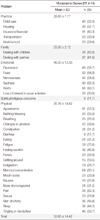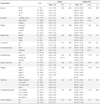Abstract
Purpose
The purposes of this study were to find the levels of distress and quality of life of breast cancer survivors in Korea and to identify relationship between distress and quality of life.
Methods
The data were collected from 122 breast cancer survivors in 2009. To measure the distress and quality of life, the 'Distress Thermometer and Problem List'and the 'Functional Assessment Cancer Therapy-Breast'were used respectively.
Results
The mean score of distress was 4.77 (±2.35) and 63.1% of the subjects reported a distress score of 4 or more, indicating a clinically significant level of distress. Among these, the most frequently reported problem area was emotion, followed by family. The mean score of the quality of life was 88.22 (±18.41), signifying 6.13 out of 10. The levels of distress and the quality of life were negatively correlated (r=-.38, p<.001).
Conclusion
The results of the study indicate that distress is prevalent in Korean breast cancer survivors and the distress is related negatively with their quality of life. Thus oncology professionals continuously need to assess distress of breast cancer survivors and to provide appropriate psychosocial interventions to improve their quality of life.
Figures and Tables
References
1. National Cancer Center. Cancer facts & figures 2011 in the Republic of Korea. Accessed October 30, 2012. http://www.cancer.go.kr/ncic/cics_g/cics_g02/cics_g027/1646 908_6065.html.
2. Yi M, Son HM. Experiences of sexual life of Korean women with breast cancer: Descriptions from focus groups and interviews. J Korean Acad Fundam Nurs. 2010. 17:187–199.
3. Yi M, Kim JH, Park EY, Kim JN, Yu ES. Focus group study on psychosocial distress of cancer patients. J Korean Acad Adult Nurs
. 2010. 22:19–30.
4. Chae YR. Relationships of perceived health status, depression and quality of life of breast cancer survivors. J Korean Acad Adult Nurs. 2005. 17:119–127.
5. Carlson LE, Angen M, Cullum J, Goodey E, Koopmans J, Lamont L, et al. High levels of untreated distress and fatigue in cancer patients. Br J Cancer. 2004. 90:2297–2304.

6. Mehnert A, Koch U. Psychological comorbidity and health-related quality of life and its association with awareness, utilization, and need for psychosocial support in a cancer register-based sample of long-term breast cancer survivors. J Psychosom Res. 2008. 64:383–391.

7. Kim SH, Jun EY, Lee WH. The factors influencing depression in patients with breast cancer. J Korean Oncol Nurs. 2006. 6:133–142.
8. Tae YK, Kim MY. Correlation between depression and spiritual health in women with cancer. J Korean Oncol Nurs. 2007. 7:169–178.
9. Hamer M, Chida Y, Molloy GJ. Psychological distress and cancer mortality. J Psychosom Res. 2009. 66:255–258.

10. Ahn E, Shin DW, Cho S, Park S, Won Y, Yun YH. Suicide rate and risk factors among Korean cancer patients, 1993-2005. Cancer Epidemiol Biomarkers Prev. 2010. 19:2097–2105.

11. Fallowfield L, Ratcliffe D, Jenkins V, Saul J. Psychiatric morbidity and its recognition by doctors in patients with cancer. Br J Cancer. 2001. 84:1011–1015.

12. Holland JC. IPOS Sutherland Memorial Lecture: an international perspective on the development of psychosocial oncology: overcoming cultural and attitudinal barriers to improve psychosocial care. Psychooncology. 2004. 13:445–459.

13. National Comprehensive Cancer Network. NCCN clinical practice guidelines in oncology. Distress management. Accessed October 16, 2008. http://www.nccn.org/professionals/physician_gls/PDF/distress.pdf.
14. Shim EJ, Shin YW, Jeon HJ, Hahm BJ. Distress and its correlates in Korean cancer patients: Pilot use of the distress thermometer and the problem list. Psychooncology. 2008. 17:548–555.

15. Thewes B, Butow P, Girgis A, Pendlebury S. The psychosocial needs of breast cancer survivors; A qualitative study of the shared and unique needs of younger versus older survivors. Psychooncology. 2004. 13:177–189.

17. Suh YO. Predictors of quality of life in women with breast cancer. J Korean Acad Nurs. 2007. 37:459–466.

18. Lee MK. A study on the characteristics of cancer patients with radiotherapy and social support, psychosocial status. J Radiol Sci Technol. 2004. 27:59–69.
19. Yi MS, Lee EO, Park YS, Choe KJ, Noh DY. A descriptive study on educational and counseling needs of breast cancer patients based on the treatment stages. J Korean Oncol Nurs. 2003. 3:5–14.
20. National Cancer Information Center. Cancer incidence. Accessed October 16, 2008. http://www.cancer.go.kr/cms/statics/stat/1215669_1611.html.
21. National Cancer Information Center. Cancer survival rate, 1993-2005. Accessed October 16, 2008. http://www.cancer.go.kr/cms/statics/survival_rate/index.html.
22. Bartlett JE, Kotrlik JW, Higgins CC. Organizational research: determining appropriate sample size in survey research. Inf Technol Learn Perform J. 2001. 19:43–50.
23. Yoo HJ, Ahn SH, Eremenco S, Kim H, Kim WK, Kim SB, et al. Korean translation and validation of the functional assessment of cancer therapy-breast(FACT-B) scale version 4. Qual Life Res. 2005. 14:1627–1632.

24. Fulcher CD, Gosselin-Acomb TK. Distress assessment: practice change through guideline implementation. Clin J Oncol Nurs. 2007. 11:817–821.

25. Kvale EA, Murthy R, Taylor R, Lee JY, Nabors LB. Distress and quality of life in primary high-grade brain tumor patients. Support Care Cancer. 2009. 17:793–799.

26. Ferrell BR, Grant M, Funk B, Otis-Green S, Garcia N. Quality of life in breast cancer. Part I: Physical and social well-being. Cancer Nurs. 1997. 20:398–408.




 PDF
PDF ePub
ePub Citation
Citation Print
Print







 XML Download
XML Download